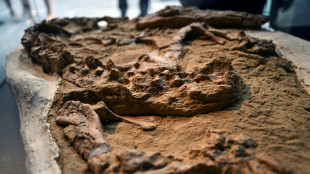
-
 Peru scientists unveil crocodile fossil up to 12 million years old
Peru scientists unveil crocodile fossil up to 12 million years old
-
At plastic treaty talks, no united front for industry

-
 Williamson falls for 93 as England fight back in first Test
Williamson falls for 93 as England fight back in first Test
-
South Korea officials say three dead in heavy snowfall

-
 High-flying Fiorentina face test of Scudetto credentials with Inter visit
High-flying Fiorentina face test of Scudetto credentials with Inter visit
-
Verstappen switches focus to re-boot defence of F1 teams' title

-
 UK filmmaker Richard Curtis makes first foray into animation
UK filmmaker Richard Curtis makes first foray into animation
-
Countrywide air alert in Ukraine due to missile threat

-
 China's military corruption crackdown explained
China's military corruption crackdown explained
-
Primark boss defends practices as budget fashion brand eyes expansion

-
 Williamson eyes ton as New Zealand take control against England
Williamson eyes ton as New Zealand take control against England
-
Norway faces WWF in court over deep sea mining

-
 Trump, Sheinbaum discuss migration in Mexico amid tariff threat
Trump, Sheinbaum discuss migration in Mexico amid tariff threat
-
Asian markets mixed after subdued pre-holiday shift on Wall St

-
 Orban's soft power shines as Hungary hosts Israeli match
Orban's soft power shines as Hungary hosts Israeli match
-
'Retaliate': Trump tariff talk spurs global jitters, preparations

-
 'Anti-woke' Americans hail death of DEI as another domino topples
'Anti-woke' Americans hail death of DEI as another domino topples
-
Trump hails migration talks with Mexico president

-
 Truckers strike accusing Wagner of driver death in Central African Republic
Truckers strike accusing Wagner of driver death in Central African Republic
-
London police say 90 victims identified in new Al-Fayed probe

-
 Air pollution from fires linked to 1.5 million deaths a year
Air pollution from fires linked to 1.5 million deaths a year
-
Latham falls for 47 as New Zealand 104-2 in first England Test

-
 US tells Ukraine to lower conscription age to 18
US tells Ukraine to lower conscription age to 18
-
Judge denies Sean Combs bail: court order

-
 Suarez extends Inter Miami stay with new deal
Suarez extends Inter Miami stay with new deal
-
Perfect Liverpool on top of Champions League, Dortmund also among winners

-
 Liverpool more 'up for it' than beaten Madrid, concedes Bellingham
Liverpool more 'up for it' than beaten Madrid, concedes Bellingham
-
Aston Villa denied late winner against Juventus

-
 Mexico president hails 'excellent' Trump talks after US tariff threat
Mexico president hails 'excellent' Trump talks after US tariff threat
-
Leicester set to appoint Van Nistelrooy - reports

-
 Coffee price heats up on tight Brazil crop fears
Coffee price heats up on tight Brazil crop fears
-
Maeda salvages Celtic draw against Club Brugge

-
 Villa denied late winner against Juventus
Villa denied late winner against Juventus
-
Dortmund beat Zagreb to climb into Champions League top four

-
 Mbappe misses penalty as Liverpool exact revenge on Real Madrid
Mbappe misses penalty as Liverpool exact revenge on Real Madrid
-
Brazil's top court takes on regulation of social media

-
 Thousands still queuing to vote after Namibia polls close
Thousands still queuing to vote after Namibia polls close
-
Trump taps retired general for key Ukraine conflict role

-
 Canadian fund drops bid for Spanish pharma firm Grifols
Canadian fund drops bid for Spanish pharma firm Grifols
-
Argentine ex-president Fernandez gives statement in corruption case

-
 Mexico says Trump tariffs would cost 400,000 US jobs
Mexico says Trump tariffs would cost 400,000 US jobs
-
Car-centric Saudi to open first part of Riyadh Metro

-
 Brussels, not Paris, will decide EU-Mercosur trade deal: Lula
Brussels, not Paris, will decide EU-Mercosur trade deal: Lula
-
Faeces, vomit offer clues to how dinosaurs rose to rule Earth

-
 Ruby slippers from 'The Wizard of Oz' up for auction
Ruby slippers from 'The Wizard of Oz' up for auction
-
Spain factory explosion kills three, injures seven

-
 US Fed's favored inflation gauge ticks up in October
US Fed's favored inflation gauge ticks up in October
-
Defence lawyers plead to judges in French mass rape trial

-
 US says China releases three 'wrongfully detained' Americans
US says China releases three 'wrongfully detained' Americans
-
New clashes in Mozambique as two reported killed


India's headhunter warriors sever past, fret over future
Once, the way to get ahead among India's Konyak warriors was by chopping off an enemy's skull. Today, the last survivors of a past age mourn the changing times -- and a new generation they see as soft.
At 90, Nokkho Konyak can barely see beyond a few feet, his facial tattoos marking him as a warrior are fading and his frail body needs support.
But his eyes light up and his hands become animated when he talks about "those simpler times".
"We witnessed our brave elders cutting off enemies' heads and participated in many battles," he told AFP.
Nokkho is a Konyak, a small but fierce and respected warrior community in northeastern India's Nagaland state.
The Konyaks were the last to give up the age-old practice of severing enemies' heads in this remote, hilly and densely forested region close to the Myanmar border.
"I am lucky to still be alive, to be around my extended family, and I feel that today's generation is too privileged," he said at Chi village, about 360 kilometres (225 miles) from the regional capital Dimapur.
- 'Heads were trophies' -
Nokkho is an old man from a dying breed that practised or witnessed headhunting before it stopped half a century ago.
"Human heads were trophies that earned you respect," he said, sitting in front of a wall decorated with the skulls of animals sacrificed by his family.
Warriors were inked with different tattoos signifying anything from participation in a battle to killing someone and actually taking a head.
As a young boy, he practised lopping off heads on large puppets, though he never severed a human one in battle himself.
The last two headhunters in the village, his two elderly friends, died about 20 years ago.
Most tribal fights happened over land and limited resources, with warriors carrying spears, axes and machetes ambushing their enemies.
Wherever possible, enemies' headless bodies were tied to a bamboo pole and taken back to the victor's village.
The head itself was taken and paraded about for the village to see, hailed as a sign of bravery to be celebrated.
"My youth was a time of great transition," Nokkho said, referring to the arrival of missionaries, who denounced headhunting and gradually converted most people from their traditional animist beliefs to Christianity.
Nokkho remembers World War II, the end of British colonial rule, the formation of the Indian state in 1947, the first roads and power lines, and now, finally, the arrival of mobile phones.
- 'Hard for women' -
Like Nokkho, 90-year-old Bo Wang, king of nearby Hongphoi village, took up hunting wild boars and other animals after "headhunting became taboo".
Wang's family, like other royals in nearby Konyak villages, has been the final local authority for generations.
"Everyone lived in fear of an ambush, and we were taught to be wary of everyone," Wang said, describing the stress of growing up with the threat of headhunters.
The area is peaceful now, he said, but he laments what he sees as a lost era.
"Everything changed with modernity, our culture is dying," he said.
"People respected hierarchy, elders and their king -- which isn't the case anymore," he added.
Dressed in a traditional red conical cap adorned with fluttering feathers and boar tusks, he sat around a fire with his peers reminiscing, saying they hoped their stories, lives and culture would not be forgotten.
But Wang's second wife, Kamya, 80, said she was glad her granddaughters were growing up today and not in the conditions she experienced.
"There was just stress, not enough food or resources," she told AFP. "It was particularly hard for women, who thanklessly worked at home, in the fields -- all the time".
Kaipa Konyak, 34, from a local tribal organisation working to support the Konyak culture, said that the history would not be lost.
"Young people are proud of their warrior traditions and culture," he said.
"We remember our roots and will strive to protect them while also securing our future with the best modern education and infrastructure."
I.Meyer--BTB



